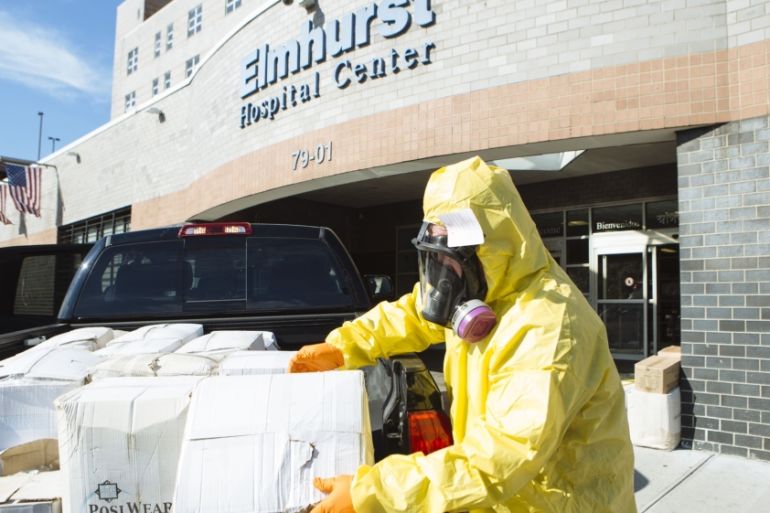Pandemic protectionism: Nations hoard masks, ventilators, meds
A growing number of countries – US, Germany, India, China – are banning the export of critical equipment and medicines.

Britain’s Queen Elizabeth II on Sunday offered a vision of a world that was “united and resolute” in battling the Covid-19 pandemic.
“This time we join with all nations across the globe in a common endeavor,” she said. “We will succeed — and that success will belong to every one of us.”
Keep reading
list of 4 itemsWill the US unemployment rate continue at historic lows?
Mexico’s teachers seek relief from pandemic-era spike in school robberies
‘A bad chapter’: Tracing the origins of Ecuador’s rise in gang violence
It’s not what the monarch meant, of course, but the common endeavor the world is engaged in now is a protectionist one. For all the rhetoric about the united fight and the need for internal cooperation, the current obsession in almost every country is how to ban exports and hoard protective masks, clothing and ventilators.
The U.S. on Friday became the latest country to impose export controls on protective equipment, banning American companies like 3M from overseas sales.
In an era in which President Donald Trump is usually leading the protectionist wave, the U.S. is actually a laggard. Dozens of countries have imposed restrictions. China and the European Union acted weeks ago. Germany’s Angela Merkel may, like the queen, call publicly for cooperation but her government banned exports of medical equipment in early March.
To economic nationalists everywhere this is an “I told you so!” moment.
The pandemic, they argue, has exposed the false promises and underlying evil realities of international alliances and supply chains. We live in a world where every nation is for itself, they crow.
The truth is somewhat more complex and less politically potent. If there is a policy failure to learn from, it’s that governments have wasted years — and not just the early months of 2020 — in preparing for a pandemic that many predicted would arrive someday.
The U.S. federal government’s inadequate stockpiles of N95 respirators and ventilators is not a failure of corporate supply chains or globalization. It’s a failure of planning for an emergency, which is the highest responsibility of governments. If we pay our taxes for any one reason, it is to be protected from calamity by our leaders, or at least our technocrats.
The quasi-black market for protective equipment exists now because of that failure. In normal times, governments are called to build up strategic reserves, whether they be of oil, grains or N95 masks, so that, in an emergency, they can be released to avoid the chaos and inflated prices and profiteering we’re seeing now.
The problem now is not a lack of domestic production. That’s been made clear in the U.S. by the manufacturers from Ford and GM to Ralph Lauren who have turned their American factories to making needed equipment.
There just wasn’t a market for what is now being urgently produced beforehand because the demand wasn’t there, which gets back to the role of governments in making markets where they might eventually be needed.
What comes next? The reality check that if you throw up barriers others will too, in all likelihood.
On Saturday, the day after Trump announced his export ban on protective equipment, India imposed a ban of its own, on hydroxychloroquine, the malaria drug the U.S. president has touted as a “game changer” in the fight against Covid-19.
Trump on Saturday said he had spoken with Indian Prime Minister Narendra Modi to appeal for the release of shipments of the drug already ordered by the U.S. The best the American president could offer, though, was that he had been told India was giving his request “serious consideration.”
When one protectionist pleads with another, that’s about as good as it gets.